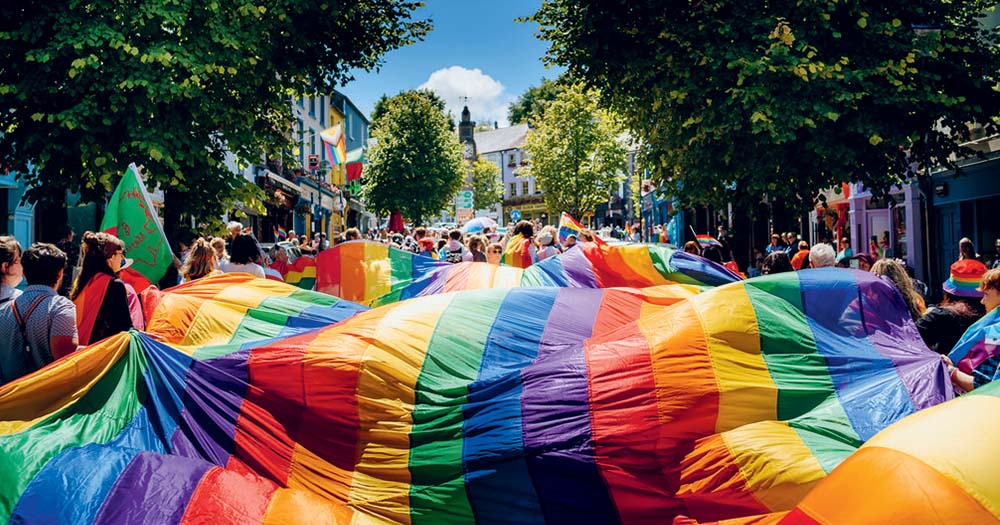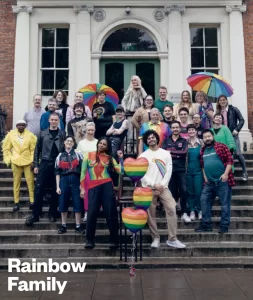In 1974, a small group of people gathered in Dublin to protest the criminalisation of homosexuality in Ireland. Nowadays, Amazon, Google, and Facebook claim to be allies, while LGBTQ+ people deal with unaccepting families, environments, and barriers to accessing healthcare. As time has gone on and LGBTQ+ rights have become increasingly mainstream, Pride season has become less radical while there has never been more at stake.
In 2024, Ireland does not legally recognise non-binary genders, the far-right has mobilised against ‘gender ideology’ and the legislation of hate crimes, and LGBTQ+ young people suffer from mental health issues at a higher rate than their straight and cisgender counterparts. Not to mention the fact that trans healthcare in Ireland consists of devastating wait times and the medical gatekeeping of gender-affirming care.
To recapture the radical energy of Pride’s past and to ensure the community does not lose its uncompromising roots, I spoke to LGBTQ+ community groups and charities to determine what we must fight for this Pride season.
ShoutOut
Ruadhán Ó Críodáin, the director of ShoutOut – a charity that hosts LGBTQ+ inclusion workshops in secondary schools – spoke to me about how ShoutOut is “telling LGBTQ+ stories,” even in the face of “misinformation and hateful rhetoric”.
ShoutOut places emphasis on “hosting open, respectful conversations, which are aimed at bringing people together,” something that is sorely needed in a time of not only political division and fear, but also conflicting views among the queer community.
“This Pride,” Ó Críodáin writes, ShoutOut is “asking LGBTQ+ people to be brave simply by standing, marching, and living our lives openly, (and) calling on our allies to stand with us so we can do so in safety.” His main advice for allies? “Educate yourself on LGBTQ+ identities, challenge misinformation and hate, and be vocal and visible allies to our community.”
View this post on Instagram
Belong To
The rise of misinformation and hateful rhetoric concerns many of the organisations that I reached out to this Pride season. Moninne Griffith, CEO of Belong To, notes how “in 2015, we told LGBTQ+ young people that they were equal, loved and valued. Things are very different today. Anti-LGBTQ+ hate crime and hate speech, particularly related to trans individuals, is on the rise.”
Griffith describes LGBTQ+ people’s mental health as “reaching crisis levels”. A recent report from Belong To and Trinity College Dublin found that LGBTQ+ young people’s anxiety and depression is three times as severe as cisgender heterosexual individuals of the same age, with self-harm being three times as likely and suicide five times more likely.
Griffith notes that “the most common age for an LGBTQ+ young person to come out is 14. The most common age for an LGBTQ+ young person’s first suicide attempt is 15. Our young people do not feel equal, safe and thriving yet.”
Similar to ShoutOut’s statement, Griffith underscored how LGBTQ+ education is becoming increasingly politicised and weaponised by the far-right: “Education has become a battleground as anti-LGBTQ+ actors show fierce resistance to the progression of sex education and inclusion of LGBTQ+ identities in the curriculum. We need to push back against this regressive voice and ensure that schools are safe environments where every child feels that they belong.”
View this post on Instagram
Trans and Intersex Pride Dublin
Trans and Intersex Pride Dublin (TIPD) further emphasised the far-right’s attack on LGBTQ+ identities. The group states that “the far-right are using both immigration and so-called ‘gender ideology’ as wedge issues to divide the working class and win people over to their fascistic agenda.”
They highlight the storming of libraries “to harass and intimidate librarians for having queer YA books,” as well as the “multiple incidents of the far-right burning accommodation intended for refugees and migrants, including burning homeless migrants’ tents on Sandwich Street”.
TIPD emphasises that in a time of political division and fearmongering, “the far-right are using the housing crisis to point fingers towards migrants” in order to “distract from the real perpetrators of the housing crisis; the Irish government”.
Lobbying and protesting for improved trans healthcare is a priority for the group. According to a study conducted by Transgender Europe in 2022, Ireland was ranked the worst country in the EU for access to trans healthcare.
There is only one clinic in Ireland that prescribes Hormone Replacement Therapy (HRT) for trans people. TIPD calls into question the fact that “the waiting list for the National Gender Service (NGS) is estimated to be over 10 years, leaving many (trans individuals) to seek HRT privately or to self-medicate.”
The NGS’s “psychiatric model of care” leads to trans people being treated “as if we have a mental illness and (being) asked extremely invasive questions”.
Trans people being seen by the NGS are “asked to disclose in detail of any abuse or trauma we might have gone through” as well as being “asked to describe how we feel during sex, our porn habits and other sexualised questions”.
In order to access gender-affirming healthcare, trans people are “expected to conform to a higher standard of gender stereotypes trans men are expected to be extremely masculine and trans women are expected to be extremely feminine, with no recognition of non-binary people and our experiences”.
Even after the waiting lists and appointments, TIPD explains that the NGS is able to “delay or withhold HRT” for any number of reasons, including “having a diagnosis of ADHD/Autism/BPD,” not being out to family members, or being on social welfare payments.
This creates a hostile atmosphere in which many trans people “are afraid to talk about their experiences with the NGS as they could lose access to much needed healthcare if they do”.
View this post on Instagram
GOSHH
Healthcare was also a pivotal issue for GOSHH, Limerick’s LGBTQ+ sexual health service this Pride season.
Erica Noonan, a representative for the group, said that strides have been made in terms of “fighting stigma around HIV, healthcare provisions for people living with HIV, reproductive and bodily autonomy for women and recognition and acceptance of LGBTQ+ peoples and the creation of visible safe spaces for the community to come together to explore and express who they are.”
However, “there are still substantial challenges society faces in Ireland”. One of the main issues Noonan raises is “equity of access to sexual health services, supports and education and access to social spaces, in particular for marginalised groups like the Travelling community, migrants and people living with disabilities”.
View this post on Instagram
Dublin Lesbian Line
I also reached out to Dublin Lesbian Line for their perspective on the necessary struggles for the LGBTQ+ community. Val, a volunteer for the helpline, tells me that Dublin Lesbian Line “believe it is important to remember that Pride season is a protest. Despite significant strides in LGBTQ+ rights, lesbians continue to face unique challenges that are often overshadowed within the broader movement.”
Dublin Lesbian Line is protesting “to demand better representation and visibility and to highlight the ongoing discrimination and violence faced by lesbians,” as well as “comprehensive legal reforms to address trans healthcare, gaps in parental rights and hate speech legislation. We stand with LGBTQ+ people globally, particularly those in conflict zones such as Ukraine and Palestine, who face extreme hardships.”
Val, like many of the other groups I spoke to, emphasises the importance of solidarity within the LGBTQ+ community, particularly with regards to trans rights: “Our protest also stands in solidarity with trans and non-binary individuals, recognising the interconnected nature of our struggles. We want to emphasise Pride’s foundations as a grassroots movement focused on genuine advocacy. By addressing intersectional issues of race, socioeconomic status, and disability, we aim to foster a more inclusive and accepting society.
“Through our actions, we seek to push for continued progress and ensure that the voices and needs of all lesbians are heard and addressed. The work of equality, diversity and inclusion is never done.”
View this post on Instagram
Mayo Pride
Last but not least, the co-chair for Mayo Pride (my home county) highlights the unique struggles that LGBTQ+ people outside the capital face this season. Shaun Lavelle spoke about the importance of representation and having a physical space to meet LGBTQ+ people.
“In a lot of LGBTQ+ movies and books, the rural queer person struggles growing up, hides their identity, then moves to a city where they find freedom and the courage to express themselves. This narrative is so ingrained that it’s almost taken as fact. However, rural areas have thriving and diverse LGBTQ+ communities. The challenges we face in these areas are the same as urban areas, but distance and isolation can make meeting like-minded people difficult.
For Lavelle, this increases the importance of rural Prides: “It’s literally the one time of year when LGBTQ+ people can meet in the same place physically to protest, get to know each other, and most importantly, have some fun.”
Now more than ever, it is clear that LGBTQ+ people and our allies must band together this Pride season. Audrey Lorde wrote that: “I am not free while any woman is unfree, even when her shackles are very different from my own.” The same principle must be adopted by the LGBTQ+ community. We are not free until we are all free.
View this post on Instagram
This story originally appeared in GCN’s June 2024 issue 384. Read the full issue here.
© 2024 GCN (Gay Community News). All rights reserved.
This article was published in the print edition Issue No. 384 (June 1, 2024). Click here to read it now.
Support GCN
GCN is a free, vital resource for Ireland’s LGBTQ+ community since 1988.
GCN is a trading name of National LGBT Federation CLG, a registered charity - Charity Number: 20034580.
GCN relies on the generous support of the community and allies to sustain the crucial work that we do. Producing GCN is costly, and, in an industry which has been hugely impacted by rising costs, we need your support to help sustain and grow this vital resource.
Supporting GCN for as little as €1.99 per month will help us continue our work as Ireland’s free, independent LGBTQ+ media.

